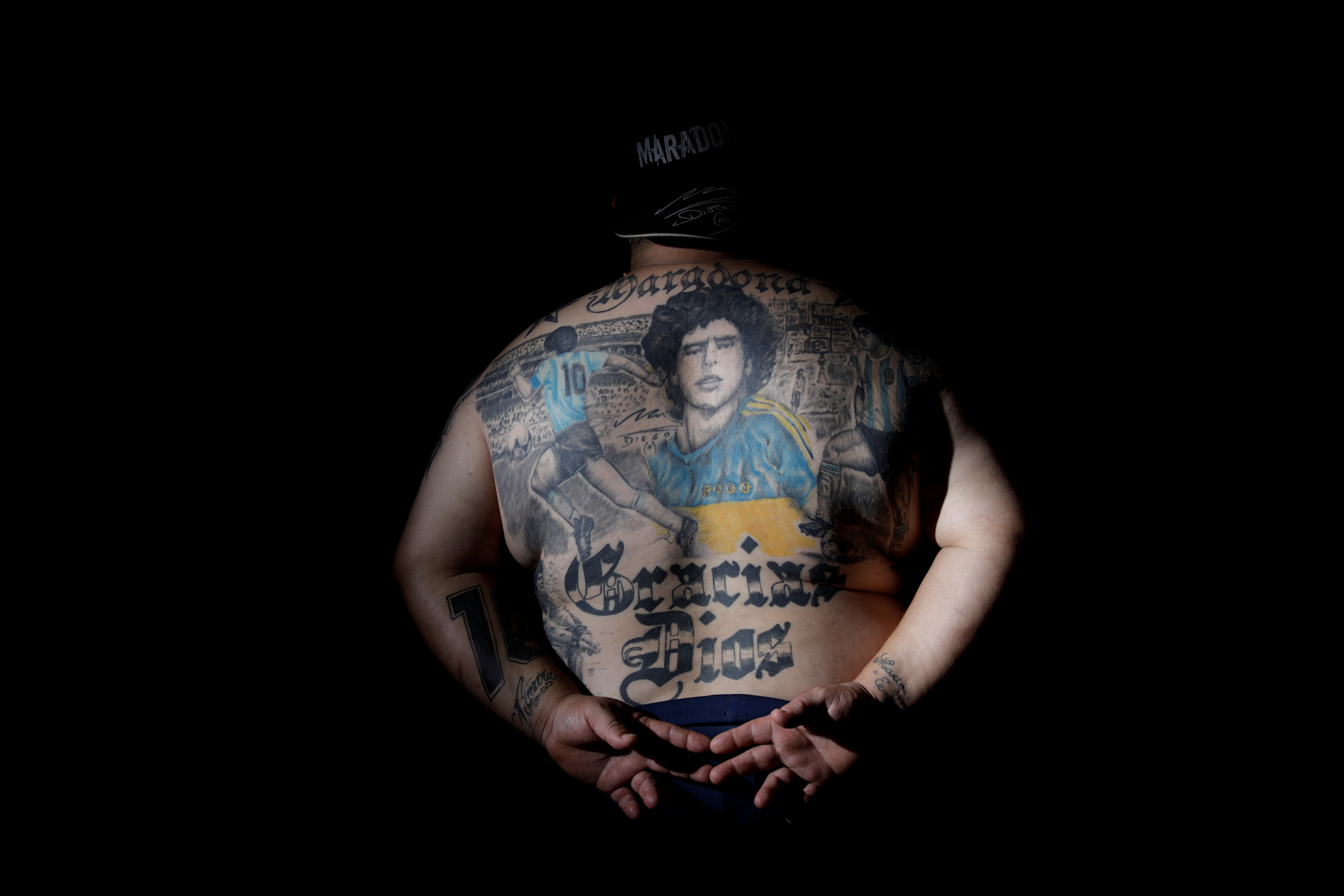Argentinians celebrate ‘eternal love’ for Maradona with tattoos
Fans of the footballing legend, who died last month at the age of 60, show the tributes they carry with them

Your support helps us to tell the story
From reproductive rights to climate change to Big Tech, The Independent is on the ground when the story is developing. Whether it's investigating the financials of Elon Musk's pro-Trump PAC or producing our latest documentary, 'The A Word', which shines a light on the American women fighting for reproductive rights, we know how important it is to parse out the facts from the messaging.
At such a critical moment in US history, we need reporters on the ground. Your donation allows us to keep sending journalists to speak to both sides of the story.
The Independent is trusted by Americans across the entire political spectrum. And unlike many other quality news outlets, we choose not to lock Americans out of our reporting and analysis with paywalls. We believe quality journalism should be available to everyone, paid for by those who can afford it.
Your support makes all the difference.Under his shirt, pizza shop owner Guillermo Rodriguez is a walking shrine to Diego Maradona. His entire back is covered in tattoos depicting the soccer great, whose death last month at the age of 60 inspired enormous grief in Argentina and beyond.
Argentina declared several days of national mourning and his body lay in state at the presidential palace.
“It is something beautiful to live with him, so for us he did not die; he will continue being there for all of us. The love we have is eternal,” says Rodriguez, whose pizza store is called “Siempre al 10”, referring to the number of Maradona's jersey.
The death of Maradona has highlighted the almost cult-like adoration that grew up around the player nicknamed “el dios” (the god), who mesmerised on the pitch and inspired fans off it despite long, public battles with addiction.
“For a woman in childbirth it is very painful. For me, I felt that pain the day that Maradona died. The grief is enormous,” says Cintia Veronica, who showed tattoos of Maradona on her arm, at her home in Buenos Aires.
“Having that tattoo now, in this moment, is to feel that he is alive. I feel that he is alive.”
A few days after Maradona's death, fan Maximiliano Fernando is in a tattoo parlour in Buenos Aires and showing off tattoos of the player on his arm, including images of Maradona in mid-stride, and another where he is holding the World Cup aloft.
“Having tattoos of Diego for me is the greatest thing there is,” says Fernando, whose bedroom walls are lined with pictures and shirts of the player. “I'm going to take him to the grave.”
Maradona won the World Cup with Argentina in 1986 and sparkled for Italian side Napoli, where he became a legend for his skills. His image is still present in the city, drawn large on murals.
In Argentina, fans have even named their children after the player, including twin girls Mara and Dona.
“It is love – it is my great love – my passion, to have Diego [on my body] so he is always with me everywhere. I feel like he protects me,” says Nerea Barbosa, showing photos of the star.
“When I got the tattoo, many told me ‘No’, that it was not for a woman and a tattoo like that was so grotesque,” says Barbosa, adding that she feels both feminist and a “Maradonian”.
“I say he was an idol for women too.”
Maradona’s death is likely to spark something of a battle over his legacy and inheritance. Officially, he has eight children from Argentina to Cuba and Italy, with other paternity claims.
Nonetheless, his wild behaviour in some ways endeared him even more with supporters, giving him an everyman air of fallibility that has ingrained him into the national psyche.
“In reality, I don't think about what people say, whether he's good or bad or whether he's an inspiration or not,” says Matias Disciosia, with a huge tattoo of Maradona's name and the number 10 on his back.
“Everything related to Maradona is a source of inspiration for those who feel him and carry his soul.”
Luciano Zarate, another devotee, agrees.
“Maradona's tattoo for me was so I could have him all the time with me, because he was my childhood,” he says. “Maradona was my childhood and adolescence. For me he is everything.”
Photography by Ueslei Marcelino, writing by Adam Jourdan, Reuters
Join our commenting forum
Join thought-provoking conversations, follow other Independent readers and see their replies
Comments